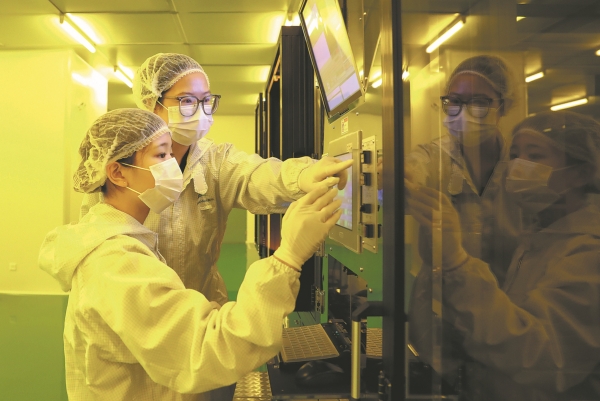
Employees operate a production facility at a State-owned tech enterprise in Lanzhou, Gansu province. LANG BINGBING/XINHUA
China's State-owned enterprises will focus on addressing critical needs in fields like aerospace, integrated circuits, machine tools and biotechnology, with the goal of overcoming technical challenges within the country's industrial system, the nation's top State-owned assets regulator said.
In an article published in this year's first issue of the Qiushi Journal, a flagship magazine of the Communist Party of China Central Committee, the State-owned Assets Supervision and Administration Commission of the State Council, or SASAC, said these efforts will boost China's technological capabilities and innovation.
The government will support SOEs in advancing major technological equipment research projects and bridging the foundational and core technology gaps within China's industrial system, the SASAC said in the article.
It emphasized that SOEs must accelerate the development of autonomous industrial and supply chains, ensuring that the initiative remains firmly in their own hands.
As SOEs hold a pivotal position in China's industrial and supply chain system and are responsible for safeguarding industrial security, they should focus on addressing bottlenecks, blockages and gaps within China's industrial system, according to the article.
The total assets of China's SOEs grew from 71.4 trillion yuan ($9.78 trillion) in 2012 to 317.1 trillion yuan in 2023, while their total profits rose from 2 trillion yuan in 2012 to 4.5 trillion yuan in 2023, demonstrating a significant improvement in both scale and quality of performance, data from the SASAC showed.
Experts said that once breakthroughs are made in basic research and original innovation, companies are likely to reshape industries and market competition, fundamentally transforming productivity. Therefore, SOEs must prioritize enhancing their innovation capabilities to better compete with established foreign rivals, they said.
SOEs should build more innovation consortia and strive to generate a number of original and disruptive outcomes, said Hu Chi, a researcher at SASAC's research center.
It is essential for SOEs to strengthen market-oriented applied basic research, enhance technological foresight, diversify strategies and master more "core technologies". They must drive the transformation of innovation within their businesses, shifting from being followers and imitators to becoming leaders and pioneers, Hu said.
Sharing similar views, Xiang Anbo, a researcher specializing in enterprise management at the Development Research Center of the State Council in Beijing, noted that it is also important to improve the diversified funding mechanism and make firm investments in areas where the government and industry urgently need innovation, but where other businesses lack the willingness or capability to invest.
"These measures will ensure long-term and stable support for basic research and original innovation, further cutting China's technological dependence on certain countries, optimizing SOEs' resource allocation and boosting exports in areas of tech-intensive green products and other high-end industrial goods," said Xiang.
Thanks to their ongoing green transformation, expansion in emerging markets and well-developed supply chains, Chinese SOEs saw their exports grow by 3.9 percent to 1.79 trillion yuan between January and November, data from the General Administration of Customs showed.
CRRC Corp, a Beijing-headquartered centrally administered SOE and the world's largest supplier of rail transit equipment by sales revenue, secured a contract for the Dubai Metro's Blue Line project in the United Arab Emirates, according to information released by Dubai's Roads and Transport Authority last month.
Valued at $5.6 billion, the contract encompasses a broad range of responsibilities, including line design, construction, commissioning, system maintenance and supply of rolling stock.
This project is expected to start operations in 2029.
China's SOEs generated more than 74.89 trillion yuan in operating revenue in the first 11 months last year, up 1.3 percent year-on-year, latest data released by the Ministry of Finance showed.